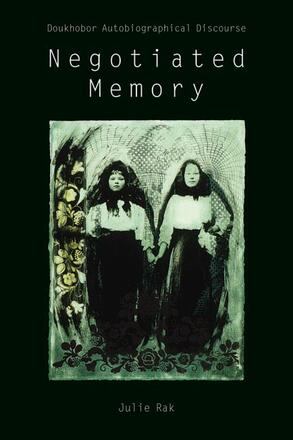
Using aspects of cultural studies and autobiography studies, this book examines how the Doukhobors of Canada employed standard and alternative forms of autobiography to create and sustain their own subjectivity and identity.
Description
The Doukhobors, Russian-speaking immigrants who arrived in Canada beginning in 1899, are known primarily to the Canadian public through the sensationalist images of them as nude protestors, anarchists, and religious fanatics – representations largely propagated by government commissions and the Canadian media. In Negotiating Memory, Julie Rak examines the ways in which autobiographical strategies have been employed by the Doukhobors themselves in order to retell and reclaim their own history.
Drawing from oral interviews, court documents, government reports, prison diaries, and media accounts, Rak demonstrates how the Doukhobors employed both “classic” and alternative forms of autobiography to communicate their views about communal living, vegetarianism, activism, and spiritual life, as well as to pass on traditions to successive generations. More than a historical work, this book brings together recent theories concerning subjectivity, autobiography, and identity, and shows how Doukhobor autobiographical discourse forms a series of ongoing negotiations for identity and collective survival that are sometimes successful and sometimes not.
An innovative study, Negotiating Memory will appeal to those interested in autobiography studies as well as to historians, literary critics, and students and scholars of Canadian cultural studies.
Awards
- Short-listed, Raymond Klibansky Prize, Canadian Federation for the Humanities and Social Science 2006
Reviews
In her methodologically ground-breaking book, Negotiated Memory, Julie Rak uses autobiographical discourse (as opposed to autobiographical genre), cultural context, and historical narrative to theorize about the relationships among the meanings of identity, place and nation…However, the book is much more than an innovative use of autobiographical discourse as a post-colonial tool useful in studying powerless groups. Negotiated Memory is also a rich cultural history of the migration and adaptation experiences of an often misunderstood religious group.
- Susan W. Hardwick, Department of Geography, University of Oregon
What Rak has written is a serious and worthwhile addition to our understanding of the way a marginalized people struggles, against all those social currents that would silence them, to find and honour a collective autobiographical voice.
- Myler Wilkinson, Selkirk College
This will be a useful and informative text for students of Canadian studies, as well as those interested in critical autobiography and identity theory ... Rak does a very good job of navigating the complex topography of Doukhobor autobiographical discourse within the Canadian historical landscape.
- Vicki S. Hallett